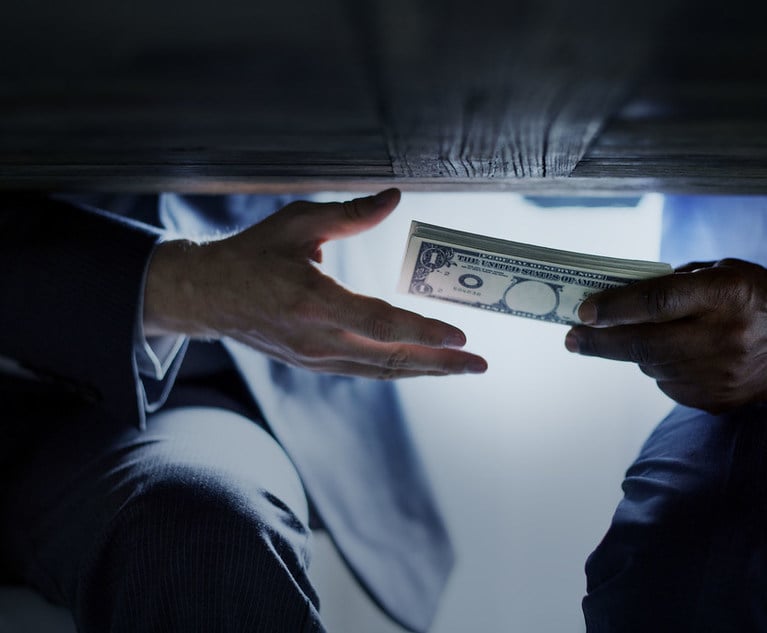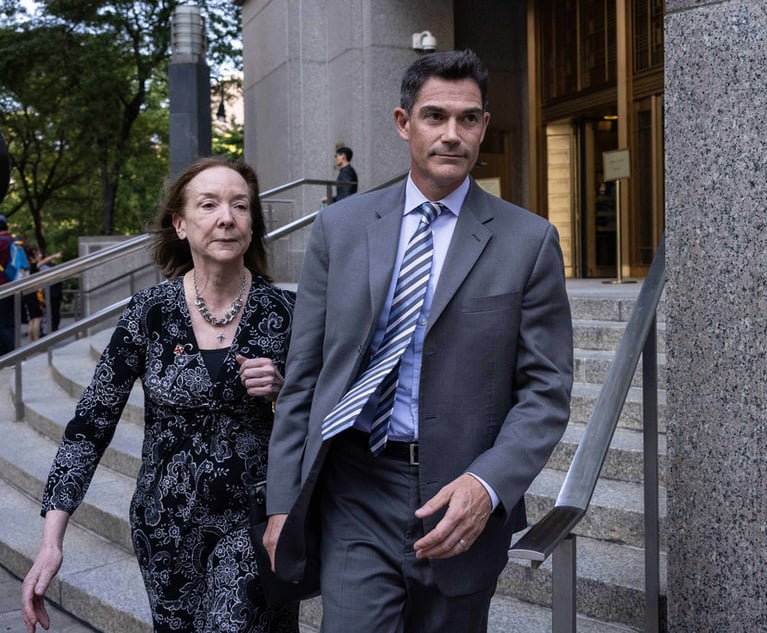Second Circuit Holds No Special Standard for Charging Campaign Contributions As Bribes
If the case is not successfully appealed, we may have an opportunity to see whether the volume of campaign contribution bribery cases in the Second Circuit increases, and whether the government brings any cases that appear to infringe on the First Amendment interests of campaign contributors and candidates.
June 10, 2024 at 02:07 PM
21 minute read
What You Need to Know
- In March, the Second Circuit reversed the dismissal of the three top counts of the indictment on bribery charges of New York's then-sitting Lieutenant Governor.
- The lower court dismissed these counts before trial, on the ground that the indictment did not even allege certain facts that the government was legally required to prove in order to sustain the bribery claims.
- Perhaps the Second Circuit's decision is not so clear cut, and the ex-Lt. Governor might have a receptive audience if he seeks certiorari to the Supreme Court on the question of whether there is a heightened quid pro quo standard for bribes involving campaign contributions.

On March 8, 2024, the United States Court of Appeals for the Second Circuit issued an opinion reversing the dismissal of the three top counts in the indictment of Brian Benjamin, New York's then-sitting Lieutenant Governor: federal programs bribery (in violation of 18 U.S.C. §666(a)(1)(B)), honest services wire fraud (in violation of 18 U.S.C. §§1343 and 1346), and a conspiracy to commit those crimes. See, United States v. Benjamin, 95 F.4th 60 (2024). These bribery charges all stemmed from allegations that in exchange for campaign contributions that Harlem real estate developer Gerald Migdol made to Benjamin's unsuccessful campaign for New York City Comptroller, Benjamin agreed to use, and did use, his power as a sitting state senator in an effort to direct state funds to a non-profit organization Migdol ran.
Judge J. Paul Oetken of the Southern District of New York had dismissed these counts before trial, a step rarely taken in a federal criminal case, on the ground that the indictment did not even allege certain facts that the government was legally required to prove in order to sustain the bribery claims. Specifically, Judge Oetken held that the indictment was insufficient on its face because: a) it did not allege that there had been an explicitly stated "quid pro quo" agreement between Migdol and Benjamin; and b) such an allegation (and ultimately proof) of an expressly stated quid pro quo agreement was legally required in a case where the alleged "quid," meaning the bribe payment, was a campaign contribution. Judge Oetken also held that in non-campaign contribution cases, by contrast, proof (and therefore an allegation) of an expressly stated quid pro quo agreement was not required; instead, in non-campaign contribution cases proof of the necessary quid pro quo agreement could instead be inferred by the jury from evidence of all the facts and circumstances before it.
This content has been archived. It is available through our partners, LexisNexis® and Bloomberg Law.
To view this content, please continue to their sites.
Not a Lexis Subscriber?
Subscribe Now
Not a Bloomberg Law Subscriber?
Subscribe Now
NOT FOR REPRINT
© 2025 ALM Global, LLC, All Rights Reserved. Request academic re-use from www.copyright.com. All other uses, submit a request to [email protected]. For more information visit Asset & Logo Licensing.
You Might Like
View All
Charlie Javice Jury Will Not See Her Texts About Elizabeth Holmes

'Erroneous Rulings'?: Wilmer Asks 4th Circuit to Overturn Mosby's Criminal Convictions
3 minute read
'You Became a Corrupt Politician': Judge Gives Prison Time to Former Sen. Robert Menendez for Corruption Conviction
5 minute read
Trending Stories
- 1'Landmark' New York Commission Set to Study Overburdened, Under-Resourced Family Courts
- 2Wave of Commercial Real Estate Refinance Could Drown Property Owners
- 3Redeveloping Real Estate After Natural Disasters: Challenges, Strategies and Opportunities
- 4Calif. Fires Should Serve as a Reminder to Fla.’s Commercial Landlords and Tenants Not to Be Complacent
- 5The Impact of Artificial Intelligence on Commercial Real Estate Transactions
Who Got The Work
J. Brugh Lower of Gibbons has entered an appearance for industrial equipment supplier Devco Corporation in a pending trademark infringement lawsuit. The suit, accusing the defendant of selling knock-off Graco products, was filed Dec. 18 in New Jersey District Court by Rivkin Radler on behalf of Graco Inc. and Graco Minnesota. The case, assigned to U.S. District Judge Zahid N. Quraishi, is 3:24-cv-11294, Graco Inc. et al v. Devco Corporation.
Who Got The Work
Rebecca Maller-Stein and Kent A. Yalowitz of Arnold & Porter Kaye Scholer have entered their appearances for Hanaco Venture Capital and its executives, Lior Prosor and David Frankel, in a pending securities lawsuit. The action, filed on Dec. 24 in New York Southern District Court by Zell, Aron & Co. on behalf of Goldeneye Advisors, accuses the defendants of negligently and fraudulently managing the plaintiff's $1 million investment. The case, assigned to U.S. District Judge Vernon S. Broderick, is 1:24-cv-09918, Goldeneye Advisors, LLC v. Hanaco Venture Capital, Ltd. et al.
Who Got The Work
Attorneys from A&O Shearman has stepped in as defense counsel for Toronto-Dominion Bank and other defendants in a pending securities class action. The suit, filed Dec. 11 in New York Southern District Court by Bleichmar Fonti & Auld, accuses the defendants of concealing the bank's 'pervasive' deficiencies in regards to its compliance with the Bank Secrecy Act and the quality of its anti-money laundering controls. The case, assigned to U.S. District Judge Arun Subramanian, is 1:24-cv-09445, Gonzalez v. The Toronto-Dominion Bank et al.
Who Got The Work
Crown Castle International, a Pennsylvania company providing shared communications infrastructure, has turned to Luke D. Wolf of Gordon Rees Scully Mansukhani to fend off a pending breach-of-contract lawsuit. The court action, filed Nov. 25 in Michigan Eastern District Court by Hooper Hathaway PC on behalf of The Town Residences LLC, accuses Crown Castle of failing to transfer approximately $30,000 in utility payments from T-Mobile in breach of a roof-top lease and assignment agreement. The case, assigned to U.S. District Judge Susan K. Declercq, is 2:24-cv-13131, The Town Residences LLC v. T-Mobile US, Inc. et al.
Who Got The Work
Wilfred P. Coronato and Daniel M. Schwartz of McCarter & English have stepped in as defense counsel to Electrolux Home Products Inc. in a pending product liability lawsuit. The court action, filed Nov. 26 in New York Eastern District Court by Poulos Lopiccolo PC and Nagel Rice LLP on behalf of David Stern, alleges that the defendant's refrigerators’ drawers and shelving repeatedly break and fall apart within months after purchase. The case, assigned to U.S. District Judge Joan M. Azrack, is 2:24-cv-08204, Stern v. Electrolux Home Products, Inc.
Featured Firms
Law Offices of Gary Martin Hays & Associates, P.C.
(470) 294-1674
Law Offices of Mark E. Salomone
(857) 444-6468
Smith & Hassler
(713) 739-1250








